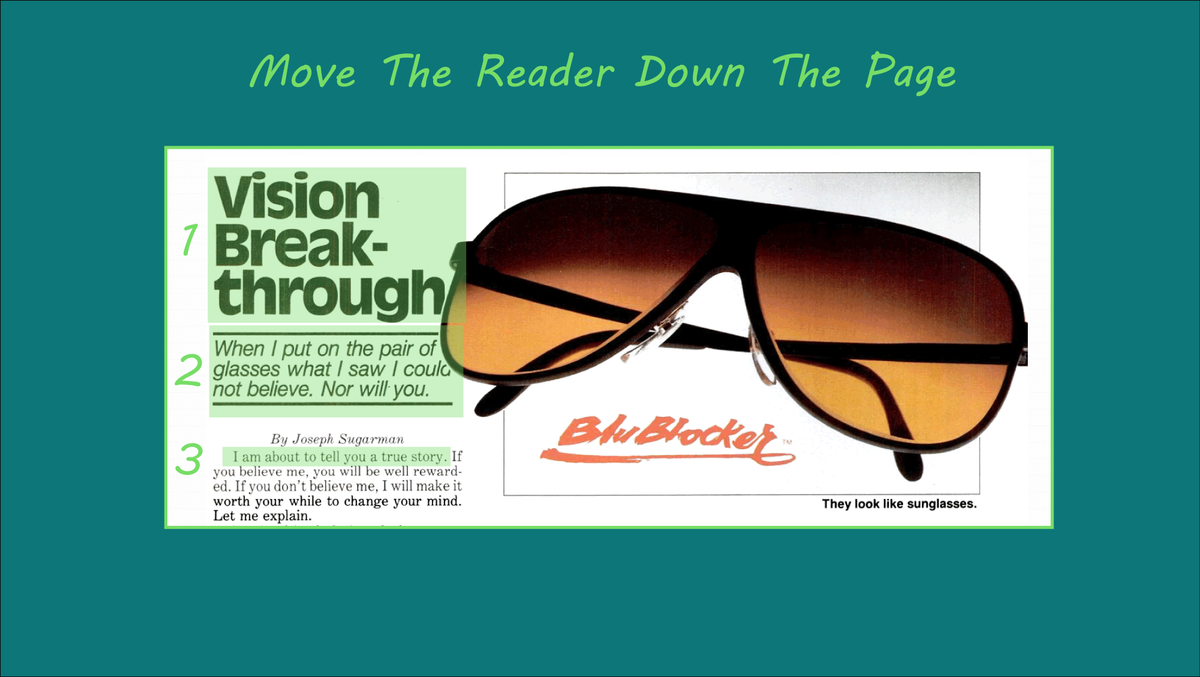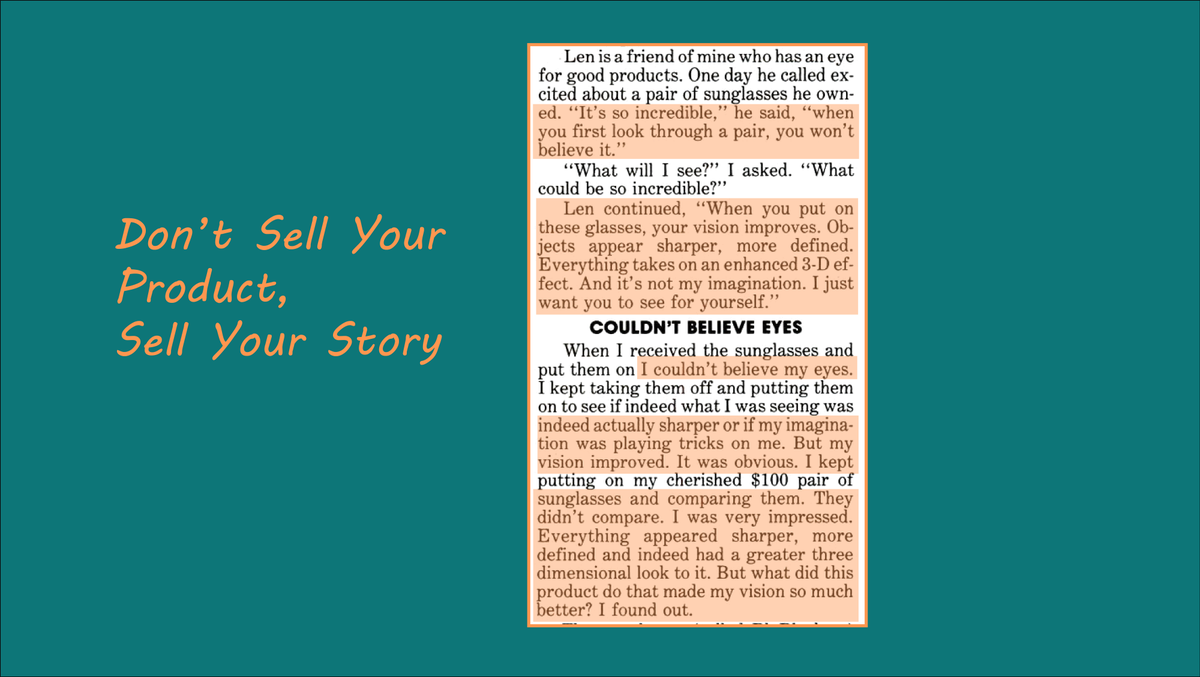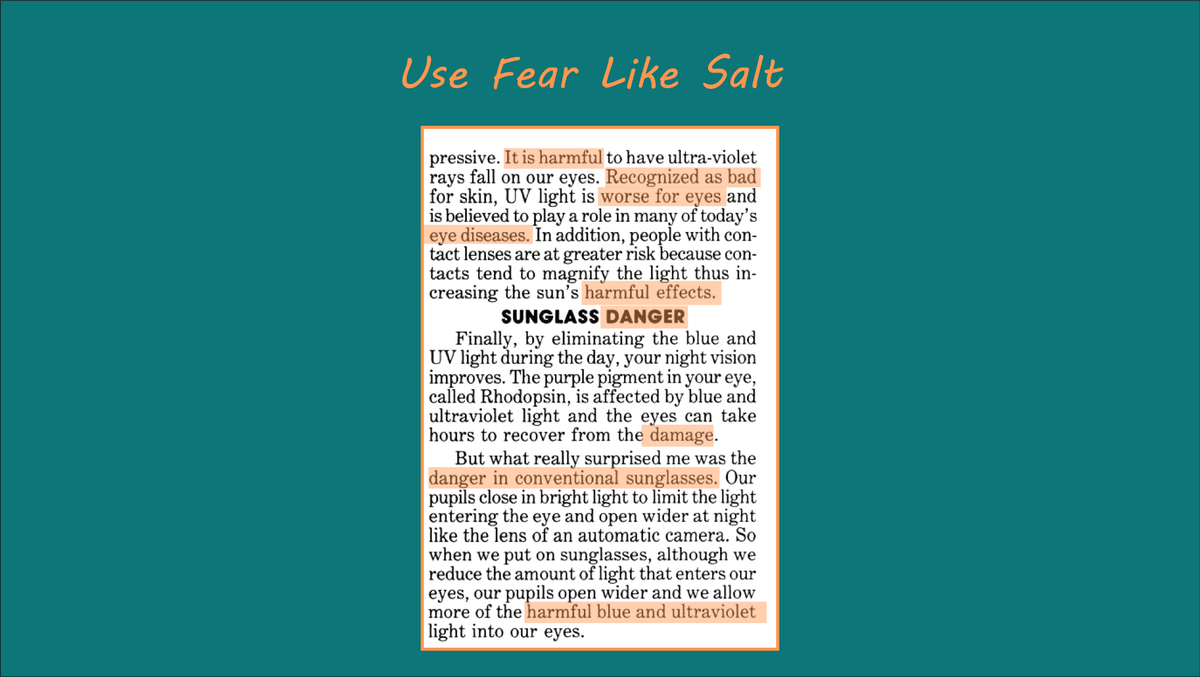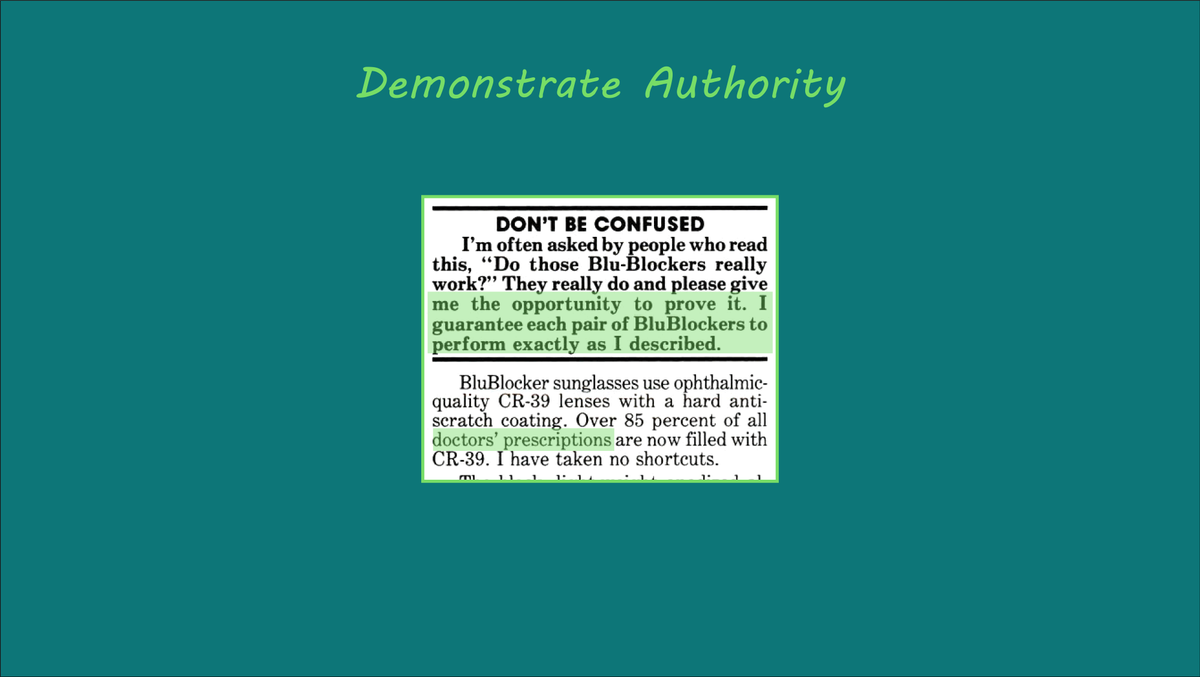Legendary copywriter Joe Sugarman once sold over 20,000,000 sunglasses with one sales page.
Today, I’ll show you how.
=THREAD=
Today, I’ll show you how.
=THREAD=

Open Strong & Curious
You have a few seconds to grab your reader.
This is even more true online.
The best way?
Intrigue.
Don’t try to be fancy. Be mysterious.
Sugarman’s opening 3 lines give you no choice but to read on.
He has your attention.
You have a few seconds to grab your reader.
This is even more true online.
The best way?
Intrigue.
Don’t try to be fancy. Be mysterious.
Sugarman’s opening 3 lines give you no choice but to read on.
He has your attention.

Tell Stories.
No one enjoys being sold
But everyone loves a story.
Instead of forcing benefits down your reader's throat, deliver them softly through story.
This way, you bypass early skepticism.
And hook the reader – with minimal effort.
No one enjoys being sold
But everyone loves a story.
Instead of forcing benefits down your reader's throat, deliver them softly through story.
This way, you bypass early skepticism.
And hook the reader – with minimal effort.

Educate Your Reader
‘Details are boring’
No.
They’re boring to you.
But the target customer is fascinated by what you sell.
Teach them about it, and you build credibility.
You’re seen as an expert.
And the more you give your reader, the more likely they’ll reciprocate.
‘Details are boring’
No.
They’re boring to you.
But the target customer is fascinated by what you sell.
Teach them about it, and you build credibility.
You’re seen as an expert.
And the more you give your reader, the more likely they’ll reciprocate.

Repetition
Great marketing wears in, not out.
Define your big idea.
And hammer it home in as many ways as possible.
Your reader should have no doubts why your product is the one they need.
Don’t know your big idea?
Ask:
What’s their biggest pain point?
Then solve it.
Great marketing wears in, not out.
Define your big idea.
And hammer it home in as many ways as possible.
Your reader should have no doubts why your product is the one they need.
Don’t know your big idea?
Ask:
What’s their biggest pain point?
Then solve it.

Use Emotion
We justify purchases with logic, but we buy with our hearts
This means:
Open with emotion, not facts.
Sugarman takes a feeling we all hate:
‘Monday blues’
And all but implies his glasses cure it.
Make your reader feel something, and you have their attention.
We justify purchases with logic, but we buy with our hearts
This means:
Open with emotion, not facts.
Sugarman takes a feeling we all hate:
‘Monday blues’
And all but implies his glasses cure it.
Make your reader feel something, and you have their attention.

Fear is Like Salt
Too much ruins a meal, but a dash is perfect.
The key is subtlety.
Don’t tell your reader the risks.
Show them what happens if they don’t use your product.
Now the reader isn’t thinking ‘Do I need these glasses?’
But ‘what happens if I don’t buy them?’
Too much ruins a meal, but a dash is perfect.
The key is subtlety.
Don’t tell your reader the risks.
Show them what happens if they don’t use your product.
Now the reader isn’t thinking ‘Do I need these glasses?’
But ‘what happens if I don’t buy them?’

Credibility Piggy-back
We’re psychologically wired to listen to authority.
I.e. Dentists recommend this toothbrush
(It’s only because they get it for free)
But you don’t need endorsement.
Even mentioning them will work.
Quote an expert, and you piggyback their authority.
We’re psychologically wired to listen to authority.
I.e. Dentists recommend this toothbrush
(It’s only because they get it for free)
But you don’t need endorsement.
Even mentioning them will work.
Quote an expert, and you piggyback their authority.

Aspirational Identities
Solving problems is great, but do you know what gets people buying?
Identity.
Tell your customer the sort of person they’ll become after your product.
👇He juxtaposes ‘alpha’ males with ‘normal’.
Promise identity and your reader will purchase.
Solving problems is great, but do you know what gets people buying?
Identity.
Tell your customer the sort of person they’ll become after your product.
👇He juxtaposes ‘alpha’ males with ‘normal’.
Promise identity and your reader will purchase.

Thanks for reading my friends!
Next week we're looking at a certain ex-presidents sales.
If you enjoyed this:
1.Follow me @ItsKieranDrew for threads to help you write well and think effectively.
2.Check out a bit of my story and what I’m up to now:
Next week we're looking at a certain ex-presidents sales.
If you enjoyed this:
1.Follow me @ItsKieranDrew for threads to help you write well and think effectively.
2.Check out a bit of my story and what I’m up to now:
https://twitter.com/ItsKieranDrew/status/1428038290804981761
TL;DR:
A breakdown of copywriting tactics, including:
• Opening lines
• Stories
• Education
• Repetition
• Appeal to the heart
• Fear
• Identity
A link:
swiped.co/file/vision-br…
A breakdown of copywriting tactics, including:
• Opening lines
• Stories
• Education
• Repetition
• Appeal to the heart
• Fear
• Identity
A link:
swiped.co/file/vision-br…
• • •
Missing some Tweet in this thread? You can try to
force a refresh








